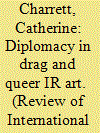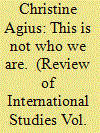|
|
|
Sort Order |
|
|
|
Items / Page
|
|
|
|
|
|
|
| Srl | Item |
| 1 |
ID:
164979


|
|
|
|
|
| Summary/Abstract |
This article presents drag performance as a queer method of critique in the field of IR, which contributes to a longstanding move in IR to engage with aesthetics, and a more recent move to engage with performance art. The article discusses the author’s making of a performance piece that revisited the EU’s response to Hamas’s success in the 2006 Palestinian legislative elections. Soft, camp, feminine, and childlike voices; a female body in men’s clothing; and the translocation of bodies in spaces are used in the performance piece to disrupt the coherency of normalised diplomacy. Queer IR theory emphasises the imperative to dismantle logics of normality that prevent creativity in response to political issues. Performative drag practices disrupt anxious attachments to a ritualised discourse of strategic interests that shapes political initiatives. This article comments on other drag moments in politics, such as the anxiety around Jeremy Corbyn’s dress, Barack Obama’s anger translator, and Janelle Monáe’s androgynous articulation of community. The form that research dissemination takes implicates the kind of knowledge that is produced. This article reviews three methodological provocations of drag, an alternative departure point of the ‘what if’, performing a politics of refusal, and a Brechtian technique of estrangement.
|
|
|
|
|
|
|
|
|
|
|
|
|
|
|
|
| 2 |
ID:
183717


|
|
|
|
|
| Summary/Abstract |
The Trump presidency ushered in a heightened sense of ontological insecurity in the US, based on a national self-narrative that portrayed an emasculated America. Trump promised to return the US to primacy by pursuing policies and practices that focused on border protection, militarisation, and the vilification of external others, while amplifying racial tensions within the country. From caging immigrant children at the border, to an enabling of white supremacy and the Capitol riots, Trump's presidency was broadly seen as aberration in the self-narrative of America as a tolerant, democratic nation. In this article, I am interested in how gendered bordering practices inform ontological (in)security in Trump's narrative of the nation, domestic and external policy, and discourses. While Trump's electoral loss to Biden in 2020 has been described as a ‘return to normal’, this article instead considers how Trump's presidency exhibited lines of continuity when examined through a gender lens. Understanding how masculinism informs ideas of ontological security reveals how notions of gendered bordering, hierarchy, and ordering have been persistent threads in US politics, rather than simply an anomaly under Trump. This suggests greater potential to read ontological security in more complex terms through gendered bordering practices.
|
|
|
|
|
|
|
|
|
|
|
|
|
|
|
|
|
|
|
|
|